Popular Reads
Top Results
Can't find what you're looking for?
View all search resultsPopular Reads
Top Results
Can't find what you're looking for?
View all search resultsUS military is in neighboring PNG, so what?
While it remains to be seen whether the recently signed US-PNG defense cooperation will ruffle not a few feathers in Jakarta over the issue of Papua, we would do well to look at our own housekeeping rather than seek to cook up a far-fetched conspiracy theory.
Change text size
Gift Premium Articles
to Anyone
T
he United States will likely be scapegoated when security issues worsen in Indonesia's "land of Papua". The central and local governments are excellent at manipulating the fundamental problems of the Papuan people to serve their interests.
The prolonged conflict in Papua, which now consists of five provinces, is fertile soil for the elite to preserve their power, no matter the suffering Papuans have to bear.
We are very good at using conspiracy theories when foreign (read: Western) countries or international organizations express concern over or condemn human rights abuses against Papuans. We ignore the voices of our Papuan brethren who want to be treated as equal Indonesian citizens.
Those of us who live outside of Papua and have little knowledge, or even empathy, about the longstanding plight of our many Papuan brothers and sisters have often responded to their aspirations for freedom with the nationalistic catchphrase, “NKRI harga mati (the Unitary State of the Republic of Indonesia, or death)!” We rarely ask ourselves why they rebel.
The Indonesian Military (TNI) and our ultranationalist establishment could regard the defense agreement the United States and Papua New Guinea (PNG) signed last week as irritating, because the pact will give Washington access to take a peek at Indonesia’s Papua. We may accuse the US and PNG of setting an agenda to undermine our territorial integrity or conspiring to support Papua’s independence from Indonesia, the way East Timor broke away from the republic in 1999.
The TNI’s top brass has not reacted to the US-PNG defense cooperation, but some generals and nationalist figures will likely link the bilateral agreement with their suspicions that the US has a hidden agenda in Papua. The new defense cooperation will give them much-needed justification for such a conspiracy theory.
In fact, PNG has proved its sincere intention to build good neighborly relations with Indonesia. Its parliament ratified a border arrangement agreement with Indonesia just a few days before Foreign Minister Justin Tkatchenko flew to Jakarta on March 21 to meet with his Indonesian counterpart, Retno LP Marsudi.



















